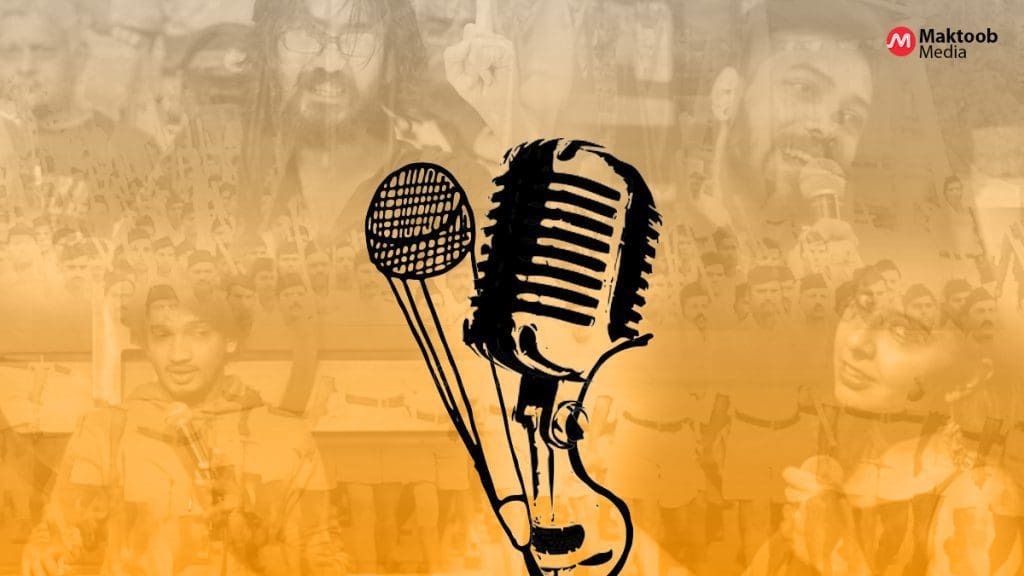
“I was all excited to open for Faruqui, never met him before but admired his work. Suddenly, when a few people stopped our show and targeted Faruqui, I stood beside him,” recalls Nalin Yadav.
“We were taken to the police station and arrested, I served the longest time in jail for supporting a Muslim comedian who was at no fault and since then I’m having a tough journey.”
In January 2020, comedian Munawar Faruqui, Nalin Yadav and two others were arrested in Indore following a complaint by a BJP MLA’s son, over a previous youtube video of Faruqui allegedly disrespecting Hindu gods and jokes he never got a chance to say in the gig.
Madhya Pradesh government is yet to file a chargesheet against them.
Yadav (25) was arrested along with Faruqui and had to spend 58 days in jail. Not even a political satirist himself, Yadav asserts he was jailed just for supporting Faruqui. The financial condition for him grew miserable thereafter, he says, “ I am trying to restart my career from point zero.” After failing to get any work in Indore after the arrest, he has been trying to find slots to perform in Delhi.
“I haven’t earned a penny since the last 10-11 months,” Yadav told Maktoob.
The recent shows of comedians Munawar Faruqi and Kunal Kamra were cancelled, citing the possibilities of unrest or violence by the police; the question of who will protect the artist and audience is apparent.
Sarthak Goswami (22), Satirist working with ‘the deshbhakt’ said, “Arrests and shows cancellation of other artists creates a subconscious dred.”
The denial to perform works like a spring that will bounce back more forcefully.” Goswami agrees that he often has to reconsider his content because someone might take offence and make livelihood riskier.
Political satirists in India have faced police proceedings against them even during the previous government. In 2012, Indian cartoonist Aseem Trivedi was arrested for posting a series of caricatures that mocked the government and the parliament.
Though Goswami believes “earlier artists were not exposed to social media or mob harassment as much as we’re today.”
In July 2020, Habitat, an open mic venue in Mumbai was vandalised over the 2019 stand-up act of a comedian named Agrima Joshua, claiming it to be an insult against Chhatrapati Shivaji Maharaj. In another instance, the Home Minister of Madhya Pradesh, Narrotam Mishra, said Comedian Vir Das won’t be allowed to perform in the state. The statement came after Das’s monologue ‘I come from two Indias’ performed at the John F Kennedy Centre in Washington DC.
In Shreya Singhal vs Union of India (2015), Justice R.F. Nariman cited the U.S. Supreme Court’s judgement on Brandenburg vs Ohio (1969), highlighting the distinction between incitement and advocacy. ‘The distinction between advocating an issue and inciting a mob for violence is subjective.’
“Comedy shows are one of the ways in which people know about things happening with politics in the U.S. in contrast to India where everyone is extremely quick to take offence,” says Supreme Court advocate Aditya Giri.
Very often political satirists are booked under sedition charges.
In 2008, when M F Hussain was charged with obscenity, he quoted Pablo Picasso, “Art is never chaste. Where it is chaste, it is not art.”
The amendments in Unlawful Activities Prevention Act (UAPA) in 2019 and its ceaseless application multiplies the difficulties for political satirists to perform art, and makes them more vulnerable.
One of the most important foundations of artistic freedom is Article 27 of the Universal Declaration of Human Rights (UDHR), which provides the right to participate in the cultural life of the community freely, to enjoy the arts and to share scientific advancement and its benefits.
“Well such is the situation in our country where it has become most difficult and most traumatic for an artist to think freely and display his creativity as an artist, and it is here that the courts of our country have to play a very important role to put an end to the robbery of Indian art,” adds advocate Giri.
In the Writ Petition (Civil) No 306 of 2019, Indibility Creative Pvt Ltd & Ors (Petitioners) versus Govt of West Bengal & Ors (Respondents), Justice D Y Chandrachud said, “Repeatedly, in decisions of this court, it has been held that once a film has been duly certified by CBFC, it is not open to any authority either of the State Government or otherwise to issue formal or informal directions preventing the producer from having the film screened. Such actions of the State directly impinge upon the fundamental right to the freedom of speech and expression guaranteed under Article 19 (1) of the Constitution of India.”
Although the judicial statement holds scope for a stronger safeguard, unfortunately, the nation has already seen a spike in right-wing going after artists.
An excerpt from the judgement reads, “Satire is a literary genre where “topical issues” are “held up to scorn by means of ridicule or irony.”
It is one of the most effective art forms revealing the absurdities, hypocrisies and contradictions in so much of life. It has the unique ability to quickly and clearly make a point and facilitate understanding in ways that other forms of communication and expression often do not.”
Jyotsna Richhariya is a student of MA Development Communication in Jamia Millia Islamia



